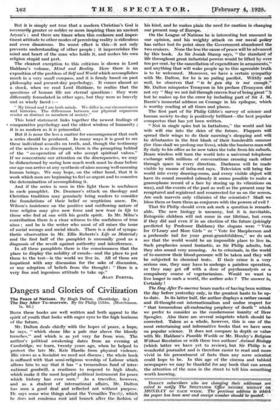Dangers and Glories of Civilization
Born these books are well written and both appeal to the spirit of youth that looks with eager eyes to the high horizons of the future.
Mr. Dalton deals chiefly with the hopes of peace, a hope, he says, " which shone lam a pale star above the bloody trenches," and which is as yet very far from- won. The author's political awakening dates from an evening at Cambridge, we learn, twenty years ago, when he helped to protect the • late Mr. Keir Hardie from' physical violence. His views as a Socialist we need not discuss ; the whole book is suffused with that semi-religious worship of LabOur which allows him to say that it has " a tremendous fund of inter-. national goodwill, a readiness to respond to high ideals„ Which make it the most hopeful political instrument for peace, which history has ever seen." As a traveller, however, and as a Student of international affairs, Mr. Dalton has seen a good deal and reflected not without purpose. He says some wise things about the Versailles Trefity, which he does not condemn root and branch after the/litshion of
his kind, and he makes plain the need for caution in changing our present map of Europe..
On the League of Nations he is interesting but unsound in our opinion, and his weighty attack on our- naval • policy has rather lost its point since the Government abandoned the two cruisers. None the less the cause of peace will be advanced by this book. As Sir Josiah Stamp says, " the standard of life throughout great industrial powers would be lifted by over ten per cent. by the cancellation of expenditure in armaments," and anything that will wake people up to this agreeable truth is to be welcomed. Moreover, we have a certain sympathy with Mr. Dalton, for he is no puling pacifiat. Wittily and _ well, he observes that " to be gun shy is not enough." Mr. Dalton misquotes Tennyson in his preface (Tennyson did not cry " May we not fail through craven fear of being great " 1) but he makes up for the error by including part of Sir J. M. Barrie's immortal address on Courage in his epilogue, which is worthy reading at all times and places.
The first part of Sir Philip Gibbs's survey of science and human society-to-day is positively brilliant—the best popular conspectus that has yet been written.
" Not in single spies but in battalions," the world and his wife will rise into the skies of the future. Flappers will spread their wings to do their morning's shopping and will be débutantes in the first blush of their hundredth• summer (for thus shall we prolong our lives), while the business man will fly daily to his office as he now takes the tube from his suburb. Beam wireless will turn the world into a universal telephone exchange with millions of conversations crossing each other through space in every direction. Darkness will be made visible by means of infra-red rays. Television will bring the world into every drawing-room, and every visible object will have its sound, recorded (already it seems possible to make a gramophone record of a face by storing up its vibrations on wax), and the events of the past as well as the present may be recaptured and registered and resurrected for us on the screen. Are such marvels only villainies of the scientists? Shall we bless, them or burn them as conjurors with the powers of evil, ?
That Sir Philip should even ask such a question is remark. able. The new biology is uncanny, but it is inevitable. Ectogenic children will not come in our lifetime, but even if they did and even if in an election of the future (jokingly predicted by Professor Haldane) the slogans were " Vote for O'Leary and More Girls " or " Vote for Macpherson and a prehensile tail for your great-grandchildren," we do not see that the world would be an impossible place to live in. Such prophecies sound fantastic, as Sir Philip admits, but they also sound very amusing. As to criminals, in the world of to-morrow their blood-pressure will be taken and they will be subjected to chemical tests. If their crime is a very serious one, they may have to undergo a painless operation or they may get off with a dose of psychoanalysis or a compulsory course of vegetarianism. Would we want to live longer in such a world, the author asks ? The answer is, Certainly
The Day After To-morrow bears marks of having been written the day before yesterday only, in the greatest haste to be up-' to-date. In its latter half, the author displays a rather casual and ill-thought-out internationalism and undue respect for " that tremendous all-embracing prophecy of death " which we prefer to consider as the cumbersome inanity of Herr Spengler. Also there are several misprints which should be corrected. Taken as a whole, however, this is one of the most entertaining and informative books that we have seen on popular science. It does not compare in depth or value with Mr. Haldane's Possible Worlds or Mr. Huxley's Religion Without Revelation or with these two authors' Animal Biology (which latter we have yet to review), but Sir Philip is a wonderful journalist and is therefore easier to read and more' vivid in his presentment of facts than any mere scientist could hope to be. In this age of- the cinema and tabloid newspapers we may be thankful for any book that can arrest the attention of the man in the street to tell him something worth knowing.






































 Previous page
Previous page